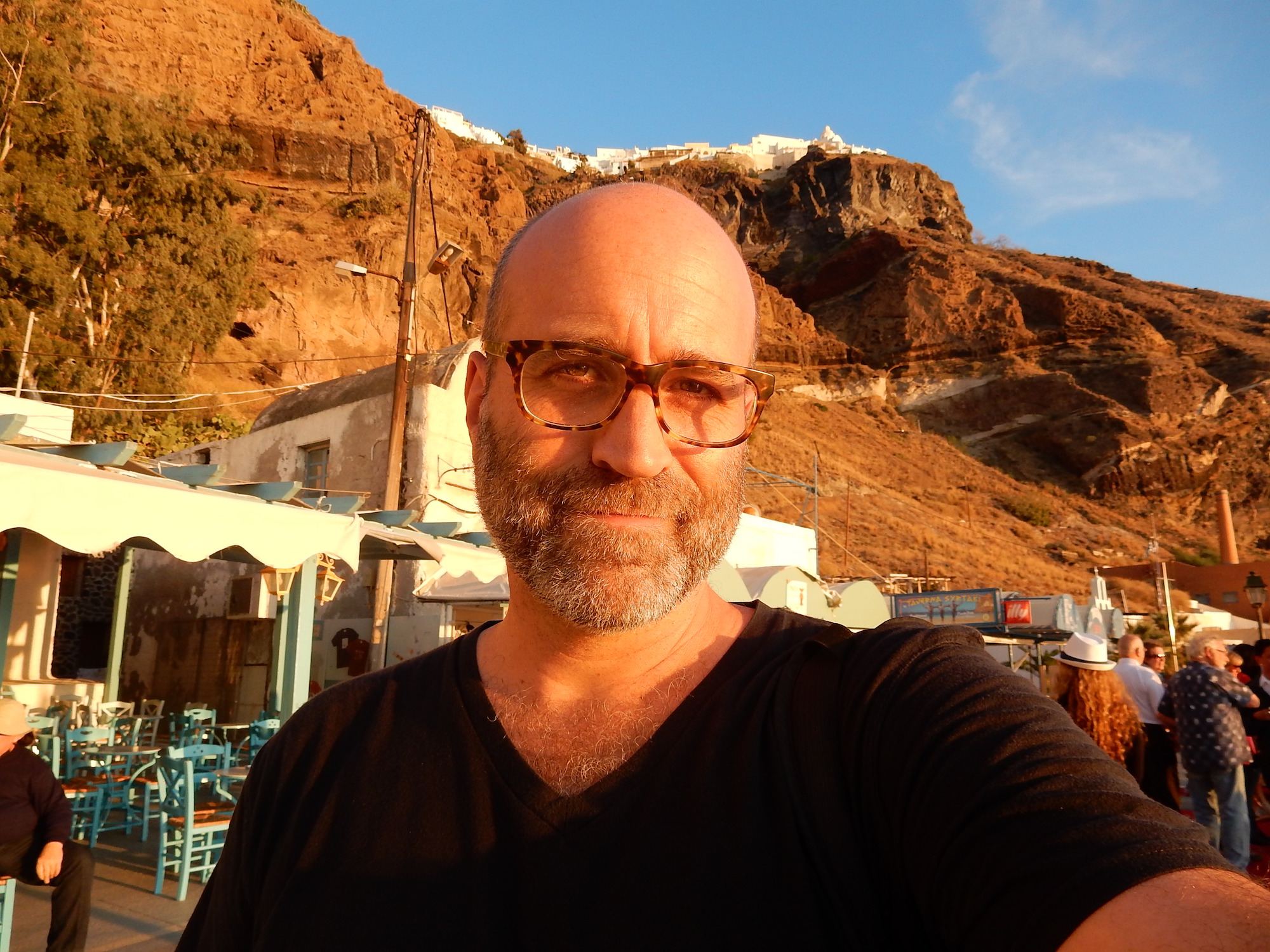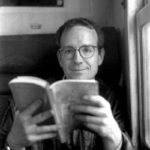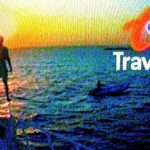Jason Cochran is the author of Here Lies America (Well Hall Books) and Editor-in-Chief of Frommers.com. He has twice been awarded the top honors in the Lowell Thomas Awards for his travel guide books and has been a regular writer for Entertainment Weekly, Travel + Leisure, USA Today and many others. A graduate of the Medill School of Journalism at Northwestern University and of Graduate Musical Theatre Writing at New York University’s Tisch School of the Arts, he also devised questions for the first prime-time season of Who Wants to Be a Millionaire (ABC).
How did you get started traveling?
My parents took me to lots of places in the U.S. and Canada, but I was just a kid and I took too much of it for granted. I didn’t start traveling for myself until I had moved out on my own. I was broke as hell—eating things like mac and cheese with sliced-up hot dogs—and working at a magazine owned by Time Inc. They kept their books balanced by bringing on freelancers, dumping them right before the day where they’d legally have to give them benefits, and then bringing them back a few months later after the clock had reset. I didn’t want to lose my place at the magazine, so instead of finding a more solid full-time gig, I started using those enforced breaks to go backpacking all around Europe. I’d come back, earn some money, get furloughed again, and pick a new set of places to see. So in a way, I was able to stoke my love of new places because of the deep corruption of American corporations.
How did you get started writing?
Writing is something I have always done. When I was in second or third grade, it was the only way I seemed to be able to get my feelings out. I wrote stories that my teachers always wanted to read to the class—until I turned to writing satire about the teachers.
What do you consider your first “break” as a writer?
In the ‘90s, the alt-weeklies were the Big Time of journalistic freedom, and I spent a summer writing for one in Florida called XS. Such a ‘90s name. It was the Tribune Company’s stab at starting an edgy publication that could do the stories the daily paper couldn’t, and I was able to dabble in lots of different styles. Soon after, I moved to New York for graduate school and I was somehow taken on at the Village Voice as an assistant to the assistant of the editor, who at the time was Karen Durbin. I felt like I had just barely jammed my foot in the door of the icon that XS was trying to imitate.
Soon I was also spending my time there on the theater section, under the great Ross Wetzsteon. He was quiet and patient and kind, and I think if I had truly known just how influential he was, I might have choked. He was one of the most crucial figures in the history of off-Broadway theater; he had been a favored student of Nabokov, and here he was coaching me on how to look for details that could carry my silly little capsule reviews. I was too green to register just how many powerhouse talents were working around me: Colson Whitehead, Michael Feingold, Guy Trebay, Nat Hentoff, Ann Powers, Robert Christgau, so many others. Everyone was both a craftsman and an artist with their own clashing sets of sensibilities but the Voice had room for them all. You’d open the paper and each story brimmed with literary and artistic references that offered me a hundred new rabbit holes of thought and learning to go down. I was stressed out in the way many 21-year-olds are, wondering if I’d ever have a future like theirs, but now I realize that as fraught as life at that paper was, I was being filled up with inspiration to carry me into the future.
I thought all publications would be as courageous and as merit-based as the Voice was. Instead, the industry went in the opposite direction. I didn’t know it, but I got there right before the sunset. Ross became ill while I was working with him. He was gone by 1998, and the Voice was gutted a few years later. My first travel writing break came when I was hired by Arthur Frommer. He ran his own business without a boardroom to kowtow to. Like the editors at the Voice, Arthur always wanted to hear the individual come through the writing. He wasn’t afraid of rocking the boat or weathering a little blowback. People trust Frommer’s for similar as they did the Voice, and that trust stems from fierce independence, and the courage that a strong identity brings. It only recently occurred to me that my time at the Voice was the perfect training to publish with Arthur.
As a traveler and fact/story gatherer, what is your biggest challenge on the road?
My biggest challenge is reticence. I eventually left hard news journalism because I hate calling strangers on the phone for quotes. People don’t believe me when I tell them, but I’m way too shy. I always recall with dread the night I was on the crime beat at the Sun-Sentinel in Florida, and there had been a murder. The Police Information Officer released the name of the suspect to me, and I had to cold-call his house to get a quote because that’s what hard news journalists are told they have to do. Someone answered the phone, I mumbled my request for comment, and they dropped it and screamed, “Mom! Dad’s been arrested!” And I thought, “Never again.” It’s not me. Certain kinds of travel stories require prying and others are more about sitting back, being friendly, and absorbing details. I’m good at putting the big picture together based on details, but if you ask me march up to someone with an objective of coaxing information out of them, I retreat into my shell, and people can smell my unease.
What is your biggest challenge in the research and writing process?
Cutting. When you properly fall in love with a topic—which I try to do, every time—you can feasibly write about it from every angle, but the commerce of writing demands you use only a small amount of space. Even for book, because all readers have internal timers that cause them to wander if your storytelling rhythms go on too long. You have to constantly make judgment calls about what to leave out and what to render as the focus. I always grieve about cutting the history, because that’s what flames my passion the most.
What is your biggest challenge from a business standpoint?
Travel writing is one of the least cost-effective, most time-consuming forms of writing, and that includes fiction. That’s because you have to do the work several times over. First you pre-research so you’re ready for the trip. Then you travel. Then you come back and write it. Then it’s edited. At a minimum, you’ll have lived each story three times before it’s done properly. Even when rates are at $2 and $5 a word, and they aren’t anymore unless you’re already famous enough not to need them to be, freelance travel writing is usually a losing proposition.
Being on staff, or being a regular writer for an industrious travel section, have been the only two ways I have been able to brook the financial realities. That’s why so much of the stuff at the New York Times leans toward luxury or toward experiences that exclude backpackers: a fair number of its writers already have the means to be traveling and taking a loss on what they write. So it’s not just my biggest challenge from a business standpoint. It affects the whole genre, because it partly determines the kinds of people who can afford to do it regularly. The lousy economics are what brought about the whole influencer phenomenon—they’re doing whatever they can to make the economics work.
Have you ever done other work to make ends meet?
I covered New York City theater for Microsoft’s Sidewalk for a while, and I also worked at Kurt Andersen’s now-forgotten Inside.com, which was an early attempt to create a subscription-based Web magazine. Every night, I’d have to watch all the late night TV talk shows and file sassy recaps of what you missed while you were sleeping. Important people started quoting me as if I were somebody, and I was just this kid sitting on his bed cranking out jokes about how lame Leno was that night. I also worked on questions for Who Wants to Be a Millionaire when it was on primetime with Regis Philbin. Travel got me that job—I had just returned from backpacking around the world for two years, so my brain was fertile ground for a general knowledge game show. I also was a consumer reporter for AOL, where I hosted an online after-show for Shark Tank. It was a weird, self-created existence. But in my adult life, I’ve always made a living either writing or hosting on video or radio.
What travel authors or books might you recommend and/or have influenced you?
I have a theory that most travel writers aren’t truly travel writers. Everyone has something specific that hooks them into a place—for some it’s food, or it’s nature, or it’s social justice, or whatever. Mine is history. Mentally, I live half my days in someone else’s past, and so I don’t read traditional travel writing as much as I read history that the writer had to travel to uncover. History and travel are extremely similar. For me, they use the same skill sets; they both require me to open my eyes and put aside my own world so I can understand someone else’s. So my tastes lean toward writers who show me new ways to understand places, and not for travel writing that’s about conquest or wild rickshaw rides. I just want to be learning all the time.
Jan Morris and Robert Hughes come to mind as two travel writers with a mystical ability to make the inscrutable understandable. I’ve been told by more than one person that my book Here Lies America reminds them of Bill Bryson, and that’s gratifying, because I love a Bryson book. I always buy Candice Millard’s latest. I love Susan Orlean and the late Tony Horwitz, And if you can get your hands on old travelogues, which were super popular in the 18th and 19th centuries, it’s like taking two trips in one—you have to learn to wrap your head around both a new place as well as a time period. Mark Twain is fine, but like Dickens, he was a very performative travel writer.
The more forgotten writers are worth exploring because they had an unfiltered way of blurting out whatever terrible ethnocentric things they were thinking: Henry Mayhew, Francis Galton, Isaac Weld, the travelogues of Tobias Smollett and Frances Trollope. That’s where you learn the most both about past cultures and the warped Western mores of the day. They feel more honest—and they can’t help but remind you to be sensitive as a writer.
What advice and/or warnings would you give to someone who is considering going into travel writing?
Develop a niche that you know better than anyone else. In newspapers, they call it a beat. Actors call it a type. In marketing, they call it branding. If it’s something that you know better than anyone else and you can write about it in your own voice, then readers will remember to come back to you for it. Whether you’re selling your work or just trying to attract readers to yours, be known for something.
What is the biggest reward of life as a travel writer?
I love the opportunity to know things deeply. It’s really as simple as that. And it’s as unattainable as that, because as deep as you may go, you can never know anything completely. Truly connected travel is a form of intimacy with yourself, yet it’s a state of total open-heartedness to someone else’s reality as well. When it works, it’s life on earth at its best.





